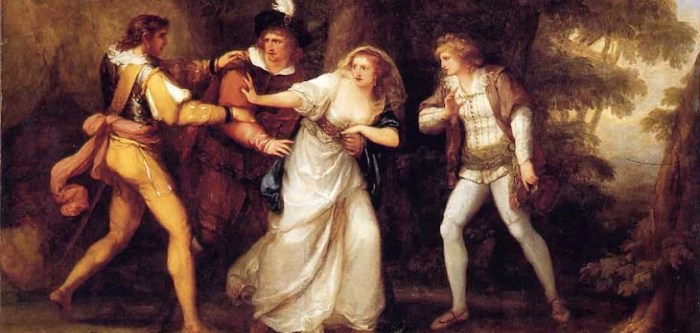Julia two gentlemen of verona monologue – Julia’s monologue in Act 4, Scene 2 of Shakespeare’s “Two Gentlemen of Verona” stands as a pivotal moment in the play, revealing the depth of her character, exploring central themes, and showcasing Shakespeare’s masterful use of language. This analysis delves into the significance of Julia’s monologue, examining its context, themes, character development, language and style, and cultural and historical implications.
Disguised as a boy named Sebastian, Julia’s monologue expresses her innermost thoughts and feelings, shedding light on her unwavering love for Proteus and her determination to win him back. Through her words, Shakespeare explores themes of love, identity, and the complexities of human relationships.
Introduction

William Shakespeare’s “Two Gentlemen of Verona” is a delightful comedy that explores the themes of love, friendship, and disguise. Julia, one of the play’s central characters, delivers a poignant monologue in Act 4, Scene 2, that reveals her inner thoughts and emotions as she grapples with the complexities of her situation.
Context of the Monologue
Julia is disguised as a boy named Sebastian in order to be near her beloved Proteus, who has fallen in love with another woman. She overhears Proteus expressing his love for Silvia and is heartbroken. Her monologue is a soliloquy in which she pours out her feelings of love, despair, and confusion.
Themes in the Monologue, Julia two gentlemen of verona monologue
- Unrequited love:Julia’s monologue expresses the pain and anguish of unrequited love. She laments that Proteus no longer loves her and is now in love with someone else.
- Gender roles:Julia’s disguise as a boy highlights the restrictive gender roles of Elizabethan society. She is forced to conceal her true identity in order to be near Proteus.
- Self-sacrifice:Julia’s monologue reveals her willingness to sacrifice her own happiness for the sake of Proteus. She is willing to endure pain and humiliation if it means that he will be happy.
Julia’s Character Development

Julia’s monologue demonstrates her growth and development as a character. She is initially a naive and innocent young woman, but her experience of unrequited love forces her to confront the harsh realities of life. Through her monologue, she emerges as a strong and resilient woman who is willing to fight for what she believes in.
Language and Style: Julia Two Gentlemen Of Verona Monologue
Shakespeare uses a variety of literary devices in Julia’s monologue, including imagery, metaphor, and symbolism. The language is rich and evocative, and it effectively conveys Julia’s inner turmoil. The monologue is also structured in a way that builds to a powerful climax, creating a sense of emotional catharsis for the audience.
Cultural and Historical Context
“Two Gentlemen of Verona” was written during the Elizabethan era, a time of great social and political change. The play’s themes and characters reflect the values and beliefs of this period. Julia’s monologue, in particular, reflects the changing roles of women in society.
During this time, women were expected to be subservient to men, but Julia’s monologue shows that women were capable of great strength and independence.
Question & Answer Hub
What is the significance of Julia’s disguise as Sebastian?
Julia disguises herself to gain access to Proteus, who believes she is a boy. This allows her to observe his interactions with Silvia and to try to win him back.
How does Julia’s monologue reveal her character?
Julia’s monologue reveals her intelligence, determination, and unwavering love for Proteus. She is willing to go to great lengths to win him back, even if it means disguising herself and risking her reputation.
What are the main themes explored in Julia’s monologue?
Julia’s monologue explores themes of love, identity, and the complexities of human relationships. She questions the nature of love and its power to both uplift and destroy.